NASP is pleased to present these virtual posters presentations. These posters have been selected for their quality and offer a new way to engage with the latest exciting School Psychological research.
Current Group: December 2025
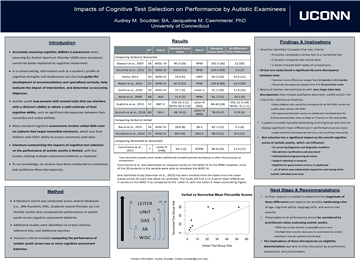 Impacts of Cognitive Test Selection on Performance by Autistic Examinees
Impacts of Cognitive Test Selection on Performance by Autistic Examinees
For typically developing youths, different cognitive tests produce similar results. However, a review of the literature reveals that this does not hold for youth with Autism Spectrum Disorder. Findings indicate that verbal, social, and processing speed demands of some cognitive tests may negatively impact the scores of autistic youths. Thus, extra care needs to be taken when selecting cognitive measures for use with autistic youth in clinical and research contexts.
[read more]
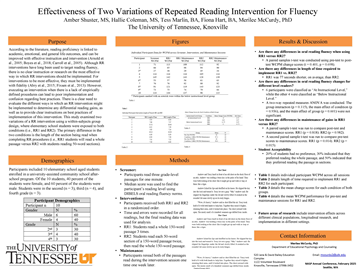 Effectiveness of Two Variations of Repeated Reading Intervention for Fluency
Effectiveness of Two Variations of Repeated Reading Intervention for Fluency
Data were collected from 10 elementary school students to determine if there were any differences between two variations of a repeated reading intervention. In condition one (RR1), participants were asked to read a 150-word passage three times. In condition two (RR2), participants were asked to read three 50-word sections of a 150-word passage twice, then read the whole passage once. Researchers collected data on the length of time required for each intervention and oral reading fluency, calculated by words correct per minute. Results of this study indicated that there are no significant differences between the administration procedures for RR intervention.
[read more]
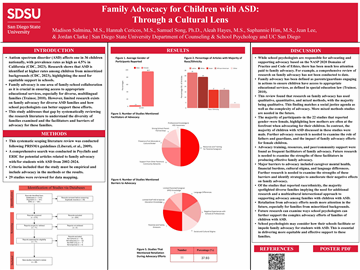 Family Advocacy for Children with ASD: Through a Cultural Lens
Family Advocacy for Children with ASD: Through a Cultural Lens
This scoping review explores how diverse and multilingual families advocate for their children with autism spectrum disorder (ASD) in schools, highlighting key facilitators and barriers. Findings emphasize the prominent role of mothers, the need for more research on fathers and female children, and barriers such as stigma and language differences. Supports like advocacy training and peer networks were commonly noted. School psychologists, educators, and administrators can use these insights to strengthen family-school partnerships and promote equitable practices that better support the advocacy efforts of these families.
[read more]
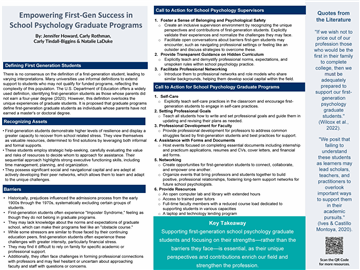 Empowering First-Gen Success in School Psychology Graduate Programs
Empowering First-Gen Success in School Psychology Graduate Programs
This poster presentation provides definitions that capture first-generation students. Additionally, a discussion about the barriers to success in navigating graduate-level education. There is also an emphasis placed on the assets of first-generation students when completing advanced graduate training programs. Finally, this poster will identify best practices that school psychology graduate programs can employ in supporting first-generation student needs and elevating strengths. The poster discusses best practices in supporting first-generation students for both school psychology professors and supervisors.
[read more]
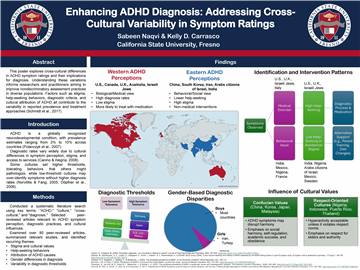 Enhancing ADHD Diagnosis: Addressing Cross-Cultural Variability in Symptom Ratings
Enhancing ADHD Diagnosis: Addressing Cross-Cultural Variability in Symptom Ratings
This poster explores cross-cultural differences in ADHD symptom ratings and their implications for diagnosis. Understanding these variations informs researchers and practitioners aiming to improve nondiscriminatory assessment practices in diverse populations. Factors such as stigma, help-seeking behaviors, diagnostic criteria, and cultural attribution of ADHD all contribute to the variability in reported prevalence and treatment approaches (Schmidt et al., 2017).
[read more]
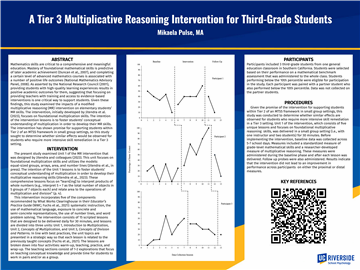 A Tier 3 Multiplicative Reasoning Intervention for Third-Grade Students
A Tier 3 Multiplicative Reasoning Intervention for Third-Grade Students
Mathematics skills are critical to a comprehensive and meaningful education. Mastery of foundational mathematical skills is predictive of later academic achievement (Duncan et al., 2007), and completing a certain level of advanced mathematics courses is associated with a number of positive life outcomes (National Mathematics Advisory Panel, 2008). As asserted by the National Research Council (2001), providing students with high-quality learning experiences results in positive academic outcomes for them, suggesting that focusing on providing teachers with training and access to evidence-based interventions is one critical way to support students. Given these findings, this study examined the impacts of a modified multiplicative reasoning (MR) intervention on elementary students’ MR skills. The intervention, initially developed by Jitendra et al. (2023), focuses on foundational multiplication skills. The intention of the intervention lessons is to foster students’ conceptual understanding of multiplication in order to develop their MR skills. The intervention has shown promise for supporting students within Tier 2 of an MTSS framework in small group settings, so this study sought to determine whether similar effects would be observed for students who require more intensive skill remediation in a Tier 3 setting.
[read more]
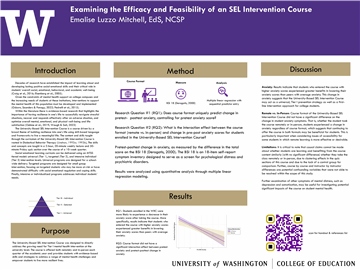 Examining the Efficacy and Feasibility of an SEL Intervention Course
Examining the Efficacy and Feasibility of an SEL Intervention Course
Decades of research have established the impact of learning about and developing lasting positive social-emotional skills and their critical role in students’ overall social, emotional, behavioral, and academic well-being. Results from this study revealed that students enrolled in a university-based SEL course were more likely to experience a decrease in their anxiety score after taking the course. This change in anxiety suggests that the course may act as a universal Tier I prevention strategy as well as a first-line intervention approach for college students. Results further revealed that course format did not have a significant interaction effect between pretest anxiety and pretest-posttest change in anxiety, indicating that perhaps students are learning and benefiting from the course similarly with no significant difference whether they take the class remotely or in-person.
[read more]
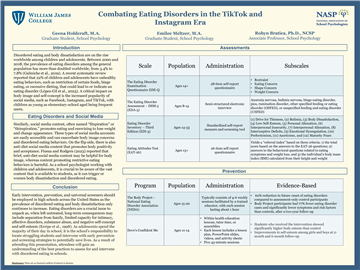 Combating Eating Disorders in the TikTok and Instagram Era
Combating Eating Disorders in the TikTok and Instagram Era
Disordered eating and body dissatisfaction are on the rise worldwide among children and adolescents. Between 2000 and
2018, the prevalence of eating disorders among the general population has more than doubled worldwide, from 3.4% to
7.8% (Galmiche et al., 2019). A critical impact on body image and self-concept is the increased popularity of social media, such as Facebook, Instagram, and TikTok, with children as young as elementary-school aged being frequent users. School psychologists are well-positioned to intervene through universal screening, early prevention, and evidence-based programs. This presentation highlights key assessment tools and reviews prevention efforts such as The Body Project and Dove’s Confident Me, which have been shown to reduce risk factors and improve body esteem.
[read more]
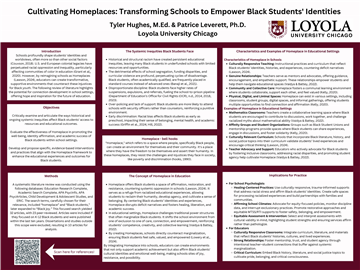 Cultivating Homeplaces: Transforming Schools to Empower Black Students' Identities
Cultivating Homeplaces: Transforming Schools to Empower Black Students' Identities
This poster highlights how schools can function as Homeplaces, spaces of affirmation, healing, and resistance, for Black students. By addressing systemic inequities and centering on students’ cultural identities, Homeplace practices foster a sense of belonging, agency, and academic success. Key implications for practice include the role of school psychologists in advancing healing-centered supports, educators in building culturally responsive classrooms, and policymakers in ensuring equitable resources. School psychologists, administrators, and teachers will gain strategies to create affirming school climates that empower Black students’ identities and transform schools into sites of possibility.
[read more]
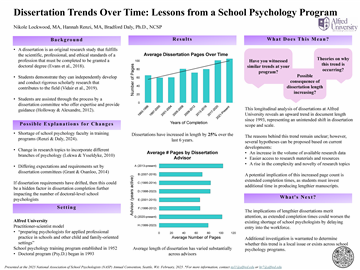 Dissertation Trends Over Time: Lessons from a School Psychology Program
Dissertation Trends Over Time: Lessons from a School Psychology Program
The goal of the project was to analyze and understand the current dissertation procedures to evaluate if there have been any drifting in dissertation practices which could influence an APA-accredited doctoral school psychology program’s graduation rate. Students and faculty engaged in an historical analysis of program dissertations going back to its inception in 1993. Preliminary analysis indicates over the last six years the length of dissertations within this program have increased by about 25% without any explicit changes in the program’s policies to increase the rigor of the dissertation requirement.
[read more]
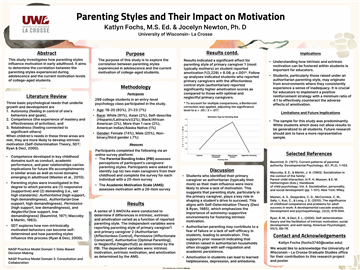 Parenting Styles and Their Impact on Motivation
Parenting Styles and Their Impact on Motivation
School psychologists play a pivotal role in helping to structure K-12 learning environments that promote the positive development of motivation skills. These skills become critical for children as they enter young adulthood and learn to navigate complex academic and social situations more independently (Morris et al., 2017). Given the significance of these skills, it is important to understand how adult caregiver behaviors contribute to positive development during the early years. Specifically, how do parenting styles relate to motivation skill development? This study investigates how parenting styles influence motivation in early adulthood.
[read more]